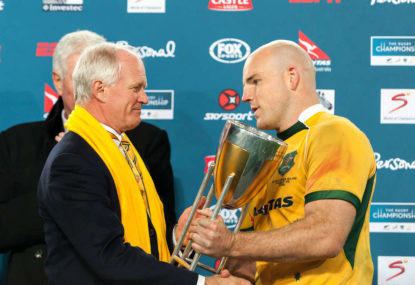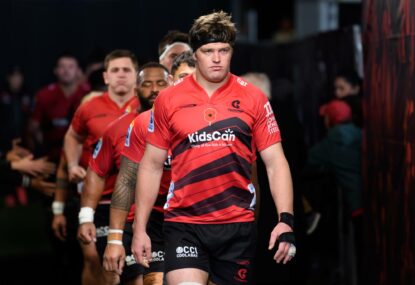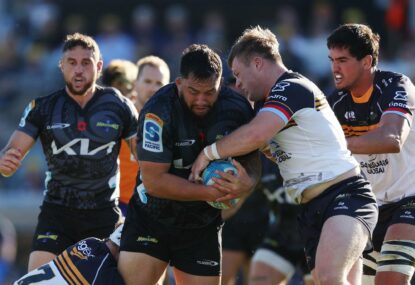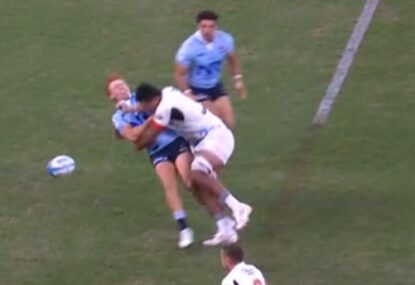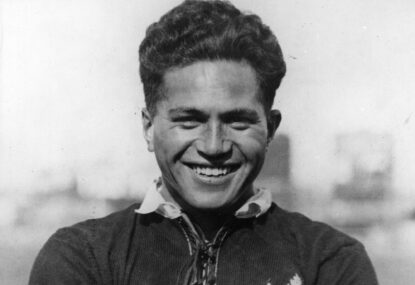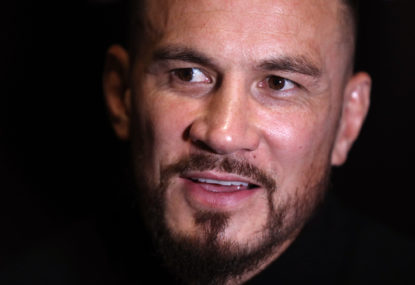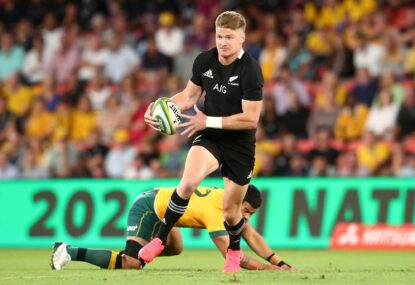The only thing harder than beating the All Blacks is beating the All Blacks immediately after they’ve lost a match. Enter the Wallabies.
Michael Cheika’s men, against the suggestions and projections of a variety of supporters from either side of the ditch, dug their heels deep in Sydney to pull off what might be the decisive win in the build-up to the 2015 Rugby World Cup for the men in gold.
Three wins a row, full of confidence and belief, the Wallabies are shaping up nicely in the prelude to the sport’s showpiece event.
Any team that can beat the All Blacks at their best can take out the Webb Ellis Cup, however the Kiwi team that fronted up over the weekend wasn’t the All Blacks at their best.
The Wallabies have the honour of facing that team at Eden Park this coming weekend.
This game provided a collection of questions and decisions that need to be addressed in the near future.
Was ‘Pooper’ everything that Australia needs?
The combination of Michael Hooper and David Pocock worked fantastically, dominating rucks and pressuring the backline in defence.
The concerns and worries about not measuring up come scrum time were thwarted as the Wallabies pack did well for the majority of the game, even when the reserve front row took the field.
The other concern was that with Scott Fardy rounding up the backrow, and no Will Skelton in the lock pairing, there may not be enough grunt and size to make considerable damage in hit-ups. This was also snuffed out by some incredible carries from Fardy and Pocock, with Dean Mumm also making the occasional damaging charge.
Hooper incorporated a dangerous running game from pick and drive options, which is something that often caught the defence off guard, and allowed for a few extra metres. Hooper actively participated in a lot more rucks as well, recognising the impact that playing along Pocock would have. This worked to great effect as he forced turnovers more than normal.
The powerhouse efforts of Fardy and Pocock’s running game, though fantastic, will be hard to repeat week-in, week-out. A lot of attention will be paid to this area of the game in the corresponding fixture this weekend.
Is our 9, 10 and 12 combo destined to be a revolving door based on form?
Who will fill our 9, 10 and 12 jerseys in a full-strength team is a constant source of debate. This week Nick Phipps has been swapped for Nic White and Quade Cooper for Bernard Foley. I’m not sold on that just yet.
White made an excellent, game-changing cameo. His 17 minutes included a 48-metre penalty goal that changed the momentum of the game, followed by a sniping run, in the Will Genia of 2011 mould, that resulted in the winning try, which he then converted.
He’d redeemed himself somewhat from that box kick last year against the All Blacks, but to slot him straight into the starting team this week undoes all the hard work Phipps has put in, including a great 40-minute performance against the Springboks and an impressive game against Argentina.
Sure, Phipps didn’t have a great game, but can all the blame be laid on him? I’d say a lot of his poorer passes could be attributed to the depth at which Foley was standing. After a mixed performance kicking from the hand in recent Test matches, Foley has started standing further back in the pocket to make sure he isn’t getting charged down.
Matt Toomua has been a revelation off the bench and has provided the straight running game that we need in the 10-12 channel, on top of his known defensive qualities.
A lot was made of Matt Giteau having to defend against the comparatively monstrous Sonny Bill Williams, but he proved all doubters wrong with a compelling game where nearly every tackle he made was around the bootlaces, making him a strong option at either 10 or 12.
As much as I was an advocate for Pooper, I’m now whole-heartedly endorsing ‘Gitmua’ as they have gelled very well together, although I’m undecided as to how to order this pair and at which stage of the game they best suit.
Do the best players start and second-string ride the bench?
Riding on from the last topic, how important is an impact player?
Firstly, what is an impact player? Do they have to be big? Do they have to be the fastest in a certain position? Should they be the most reckless or do they still need an air of caution over their playing style?
I tend to think of them as people who come on to influence the game because they are hard-running and cool under pressure. They can win you a game if you’re slightly behind, but they won’t lose you the game if you have a slim lead.
The selections on the bench saw us experience so much success in the last 20 to 30 minutes of the Rugby Championship matches.
Look at the stats from the recent matches; against South Africa we were down 13-7 at half time, 20-7 at the 45th minute, but came back to win 24-20. The following week we snuck into halftime with a slender 8-6 lead over Argentina and went on to dominate the match, eventually winning 34-9.
Players like James Slipper, Tatafu Polota-Nau, Will Skelton, Ben McCalman and Matt Toomua all came on and added value by being dangerous with ball in hand, making good metres in contact and remaining calm despite the close proximity between Wallaby and All Black scores.
Kurtley Beale and Greg Holmes differ from this definition. Beale is a unique player, inconsistent at times, but with the ability to turn a game on its head and make something from nothing. I’m not sure he is the finisher the Wallabies need, especially if being played as a winger, but he has x-factor in abundance.
Holmes is the opposite – not flashy at all and he himself seems surprised if he runs more than a few metres per carry, but he is invaluable as a sturdy scrummager and someone who does all the little things right.
With all of this in mind, it can be argued that a lot of these players have qualities better than their starting counterparts, but the value they provide as finishers doesn’t go unnoticed, and we’ll find it’ll take more than just one good hit-out to usurp a run-on player.
Observations and changes
The front row is improving continually. Gone are the days of the Australian scrum being a penalty magnet killing off any attacking chances and giving away countless shots at goal. Although as strong as our scrum is becoming, we cannot call it a strength just yet. We have gained parity with a lot of nations, but I doubt the English and Welsh are quivering at our set-piece.
On that topic, the lineout was notably dodgier without Rob Simmons. Stephen Moore wasn’t having the best night with his throws, but Dean Mumm and James Horwill aren’t regular callers in this set up (at least not recently) and so they still need to fine-tune a few things.
This pairing played well together, and although Mumm and Skelton have swapped their run-on and bench positions for this week, another good performance will make it interesting as to where Rob Simmons fits in, and if he does, whether Skelton will go back to pairing up with him. Mumm ran well again and gets as involved in rucks as he can, I’d keep him in my 23 as he also offers utility as a 6 if required.
The last observation I want to bring up is the tactical kicking. Aside from a great stab through to find touch 30ish metres down the field and a well-placed bomb from Toomua that Adam Ashley-Cooper was able to bat back to our forwards, the Wallabies far too often kicked centre field; a dangerous approach when playing a team with the counter-attacking ability of the All Blacks.
Whether this was the game plan or not, I’m not sure, as this ploy could have been used to isolate outside backs and try to force turnovers. However, more often than not the Wallaby kickers did not find touch. Giteau, Foley and Drew Mitchell all kicked down the middle at one point or another – given none of these players have particularly long-range boots, it seemed an odd tactic.
Toomua has a good kicking game and can place the ball well, as evidenced by his midfield bomb and grubber, both to a charging Ashley-Cooper.
With all of this in mind, I’d like to propose the following team to take on the All Blacks at their Auckland fortress:
1. Scott Sio
2. Stephen Moore (c)
3. Sekope Kepu
4. Dean Mumm
5. James Horwill
6. Scott Fardy
7. Michael Hooper
8. David Pocock
9. Nick Phipps
10. Matt Toomua
11. Drew Mitchell
12. Matt Giteau
13. Tevita Kuridrani
14. Adam Ashley-Cooper
15. Israel Folau
16. Tatafu Polota-Nau
17. James Slipper
18. Greg Holmes
19. Will Skelton
20. Wycliff Palu
21. Nic White
22. Quade Cooper
23. Henry Speight
The team from last week did such a fantastic job, so it was hard to make unforced changes, but I will go against that notion to offer a few limited changes. The forwards remain the exact same as Simmons is still unavailable and Sean McMahon has been temporarily released from the squad to help the World XV team.
McCalman did nothing wrong, in fact he offers a lot as a replacement for Fardy, but with the lack of recent game time I would like to see Palu get a run from the bench. Many will argue that he doesn’t offer a lot in the lineout, which is further burdened if Skelton comes on at the same time, but the impact he makes with his running game is without comparison when he is at full strength. Given his recent rest, this could be the barnstorming Palu everyone wants to see get released against the men in black.
In the backline, I’ve opted for Toomua over Foley. This is a tough choice as Toomua coming off the bench seems to be the turning point in our games as he offers a different running angle and aggressive defence that the other inside backs don’t have. Ideally I’d have given Christian Lealifano a run off the bench, as he offers a lot and partners well with Toomua, as well as being able to cover both 10 and 12, but his inclusion in the World XV squad means Cooper gets the nod.
I haven’t dismissed Foley purely because of his most recent game, but with limited game time in Super Rugby this year, as well as having to play out of position in Argentina due to Toomua’s injury, Cooper needs one last attempt off the bench before deciding if he is worthy of a spot in the Wallabies’ best 23. It can be argued that he plays better when given a starting berth as it gives him the opportunity to steer the game and control it in his tempo, but that’s why this will be a test of his quality. Whether you have an allegiance with him or Foley, or neither for that matter, it can’t be argued that he has skill in abundance when switched on. His partnering with Toomua was the highlight of Tests gone by and I’d love to see that reignited.
Speight has been chucked on as he has been unavailable due to suspension for previous Tests. Heralded as one of the best finishers in Australian rugby, he has one last chance against quality opposition to prove he’s worth the hype that was surrounding him. This isn’t just an ‘oh well, chuck him on’ kind of suggestion, as winning the Bledisloe is far too important. This is a suggestion based on having four wingers – Ashley-Cooper, Mitchell, Joe Tomane and Rob Horne – who have all shown what they offer in recent Test matches.
It’s up to Speight to seize this hypothetical opportunity with both hands and cement a spot in the 31 that travel to the United Kingdom next month.





























































































